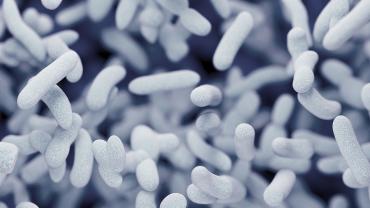
The gastrointestinal (GI) microbiome supports human health in many ways. The microbial composition in a healthy adult consists of a diverse amount of various bacteria, including Bacteroides, Lactobacillus, Prevotella, Clostridium, Enterococcus, and Faecalibacterium. However, the adult human microbiome can exhibit a reduction in bacterial diversity in the presence of inflammation or certain illnesses.
Conditions involving chronic GI inflammation, such as inflammatory bowel disease (IBD) can involve an imbalance in GI microbiota and a reduction in bacterial diversity. This can cause downstream effects due to changes in the number of metabolites from microbes. For instance, species in certain Bacteroides, Lactobacillus, and Clostridium genera have been shown to produce bile acids, tryptophan metabolites, and short-chain fatty acids (SCFAs). These metabolites have been shown to influence intestinal permeability, epithelial repair, cellular differentiation, and barrier integrity.
A recently published review article by Wellington and colleagues explored the efficacy of supplementation with vitamin D, fish oil, and resveratrol on the gut microbiome in the presence of IBD. Lower vitamin D levels have been associated with worse outcomes related to IBD. Vitamin D supplementation may increase the signaling between vitamin D and its receptors. The authors of this study postulate that upregulated vitamin D receptors (VDRs) can lead to increases in microbes that produce SCFAs. The elevation of the expression of VDRs may also improve intestinal barrier function and modulate the secretion of certain pro-inflammatory cytokines. The downregulation of VDRs has also been associated with a reduction in certain beneficial bacteria including Lactobacillus sp.
Wellington and colleagues also investigated the role of fish oil to support microbial gut health in the presence of IBD. One study with more than 200,000 participants showed a correlation between the increased consumption of docosahexaenoic acid and the incidence of Crohn’s Disease (CD). Another study involved individuals with both CD and ulcerative colitis who consumed diets enriched with fish oil. Significant changes in the receptors for interleukin (IL)-1 were observed, suggesting a block of IL-1 cell activation. Increases in Bifidobacteria, Lactobacilli, and other bacteria were observed in the presence of fish oil supplementation.
Resveratrol has also been studied for its supportive role in the gut microbiome. In studies involving IBD, resveratrol has been shown to decrease inducible nitric oxide synthase expression and increase the abundance of Bifidobacterium and Lactobacillus. Supplementation with resveratrol was also shown in animal studies to attenuate the deterioration of colonic wall structure in the presence of colitis.
The interplay between bioactive molecules and the gut microbiome is still being elucidated in modern research. However, studies, such as the one published by Wellington and colleagues show promise that fish oil, vitamin D, and resveratrol may support a healthy gut microbiome.
By Colleen Ambrose, ND, MAT